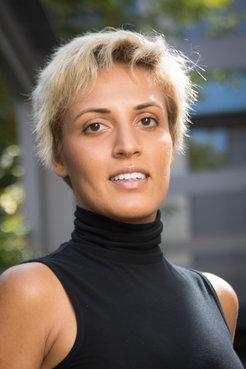Prineha Narang commences research stay with Max Planck Award and Humboldt Bessel Prize

Prineha Narang holds a professorship at the University’s John A. Paulson School of Engineering and Applied Sciences, leading the NarangLab. Her group has made key contributions in predicting the behavior of quantum systems and how to harness these effects. “Our work is at the vibrant intersection of computational science, phenomena away from equilibrium, and control of dynamical correlations in materials and molecules,” says the Harvard scientist.
“We are truly cross-disciplinary across computational physics, ultrafast and nonequilibrium science, theoretical quantum chemistry, and quantum nanophotonics and quantum information, and we collaborate with scientists in each of those fields.” She greatly looks forward to bridging those fields in Germany where she hopes to create new ways to explore the underlying mechanisms of driven quantum matter. The Max Planck Award also enables Narang to bring group members to Germany, forming deep collaborations.
Describing the MPSD and the city of Hamburg as the perfect location for her research, Narang hopes to find innovative methods for the analysis of coupled light-matter systems in the newly developing field of ab initio quantum optics, electrodynamics and polaritonics.
Andrea Cavalleri, the MPSD’s managing director, says: “We are all looking forward to having Prineha Narang in Hamburg. Pri is a rising star in theoretical physics and chemistry and is already collaborating widely with our groups at the MPSD. The ability to attract scientists of her calibre for an extended period speaks volumes of the ever increasing attractiveness of Hamburg as a city of science.
“Our Institute, the Cluster of Excellence CUI : Advanced Imaging of Matter and the many international partnerships in which we participate are making the campus in Bahrenfeld a renowned location for new discoveries in non-equilibrium phenomena. We are also very grateful to the Max Planck Society and to the Humboldt Foundation for their generous support, without which these connections would not be possible."
The director of the MPSD Theory Department, Ángel Rubio, expects Narang‘s stay to unlock new avenues of research: “We are very pleased that Prineha, one of the most innovative, highly accomplished and creative scientists of her age, is joining us in Hamburg. There are many points of intersection between her work and ours, in particular on nonequilibrium dynamics in low dimensional and topological quantum matter as well as quantum emitters for quantum information technologies. Those directions hold tremendous potential for breakthroughs across areas of physics.
“Prineha’s stay could lead to long-standing collaborations with us and other groups on the Science Campus Bahrenfeld in Hamburg and all across Germany. We are very grateful to the Max Planck Society and the Alexander von Humboldt Foundation for their support!“
During her time in Germany, Narang will also collaborate closely with Stuart Parkin, Director at the MPI of Microstructure Physics in Halle, and Claudia Felser, Director at the Max Planck Institute (MPI) for Chemical Physics of Solids in Dresden.

“Receiving both of these distinguished awards has transformed the questions and curiosity-driven science I get to pursue over the next year,” says Narang. “I am beyond excited for the opportunity and freedom to ask these fundamental high-risk high-reward questions in non-equilibrium and excited state dynamics, to work with colleagues across Germany and experience science at the Max Planck Society.”
Prineha Narang came to Harvard University from the Massachusetts Institute of Technology where she worked as a Research Scholar in Condensed Matter Theory in the Department of Physics. She received an M.S. and Ph.D. in Applied Physics from the California Institute of Technology (Caltech). Prineha’s work has been recognized by many awards and special designations, including the IUPAP Young Scientist Prize in Computational Physics (2021), an NSF CAREER Award in 2020, being named a Moore Inventor Fellow by the Gordon and Betty Moore Foundation for pioneering innovations in quantum science, CIFAR Azrieli Global Scholar by the Canadian Institute for Advanced Research, a Top Innovator by MIT Tech Review (MIT TR35), and a Young Scientist by the World Economic Forum in 2018. In 2017, she was named by Forbes Magazine on their “30under30” list for her work in atom-by-atom quantum matter engineering.













